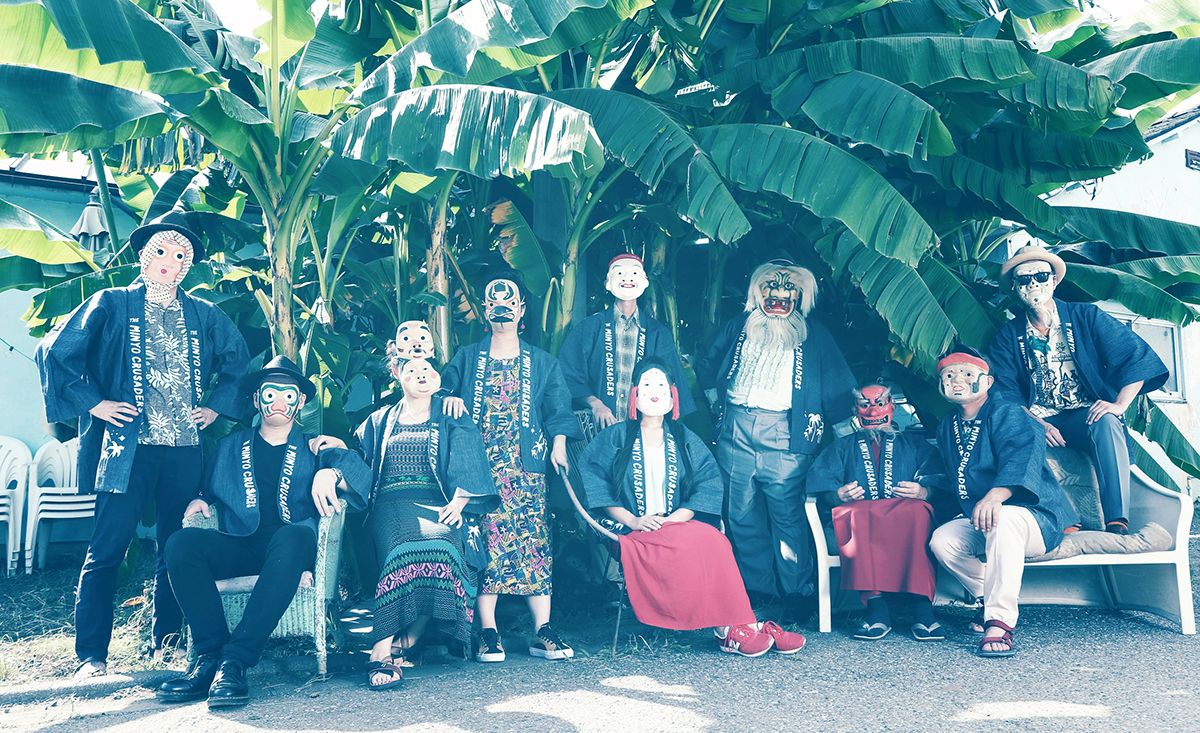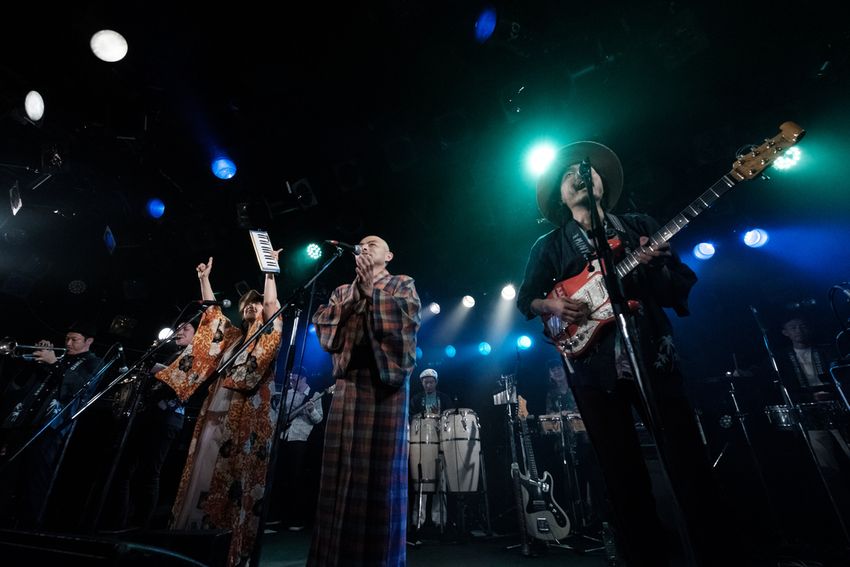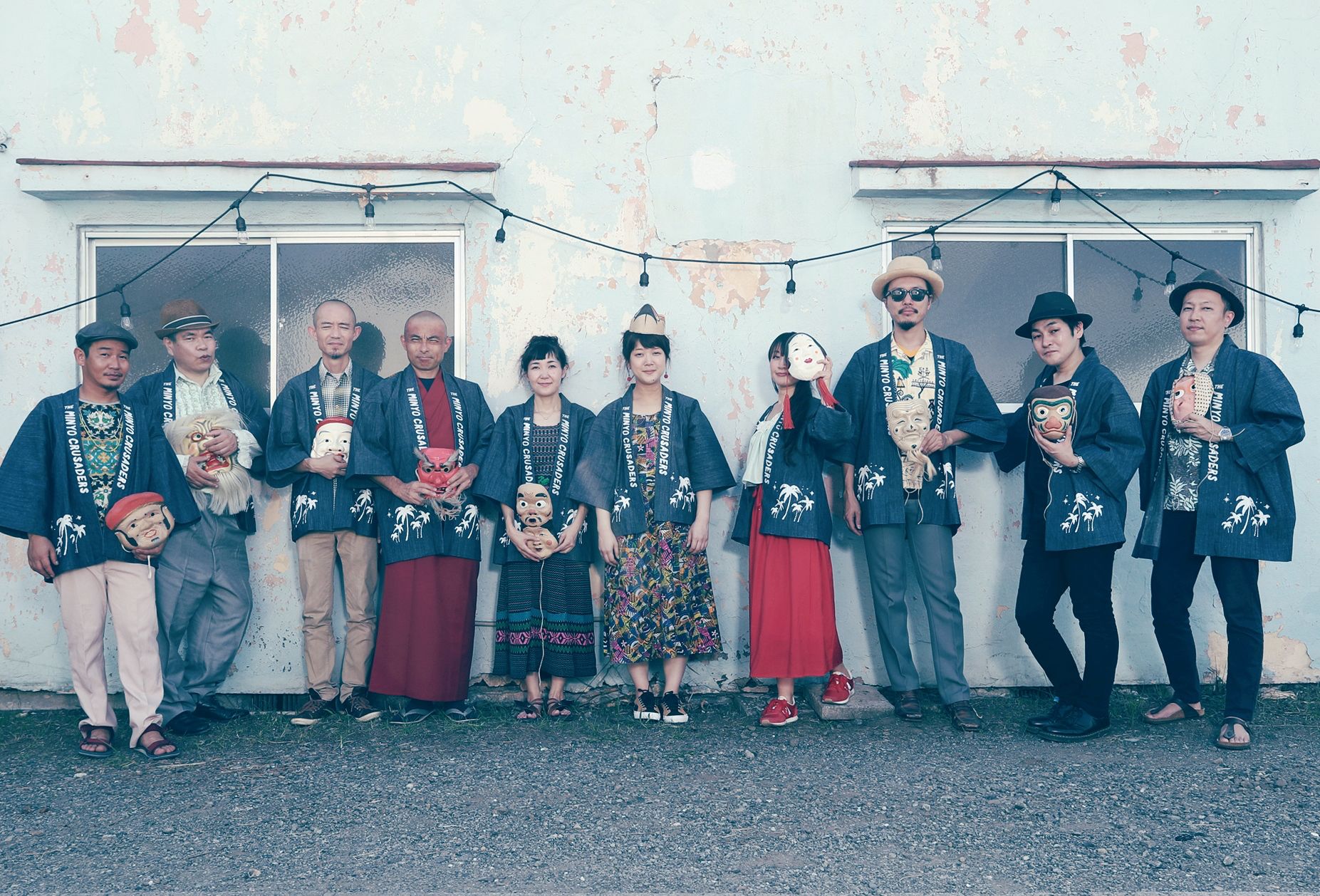Minyo Crusaders

“Minyo Crusaders sound like nothing else on your Spotify playlist” The Times
Brazilian bands playing Afrobeat, European bands reworking Ethiopian grooves, African bands taking influence from Cuban music – the adoption of music styles from one region by another is nothing new – yet a Tokyo-based ten-piece reworking Japanese folk songs (min’yō) with influences from Africa, Asia, the Caribbean and South America? Meet the Minyo Crusaders . . .
“Echoes of Japan”, their debut album, was released last year to widespread critical acclaim, marking the arrival of a big band like no other, where distinctive min’yō vocals ride over grooves that join the dots between cumbia, Ethiopian jazz, Thai pop, Afro funk and reggae.
On stage bongos, congas, and timbales provide the percussive backbone, over which rippling bass and searing guitar ride, with sax, trumpet and keys embellishing the grooves as vocalists “King” Freddy Tsukamoto and Megu add the final touches with their soaring min’yō vocal stylings. And they look as good as they sound too: sporting a mix of vintage and denim kimonos, tropical shirts and Japanese Edo masks it’s like they’ve just stepped off the set of a Wes Anderson movie.
Following 2019 festival appearances at Fuji Rock in their native Japan, WOMADelaide in Australia and Trans Musicales and Le Guess Who in Europe, Minyo Crusaders – or MinCru as their Japanese fans know them – return to Europe in July and August 2020 for an extended tour that will showcase their joyous and infectious take on Japanese folk culture ahead of this summer’s Olympic Games.

“We want to bring minyo to the world” Katsumi Tanaka (Minyo Crusaders)
Initially indifferent to min’yō, a tragic event in recent Japanese history set the Minyo Crusaders’ band-leader Katsumi Tanaka on his current path: “Following the Tohoku earthquake of 2011, I reflected on my life, work and identity. A fan of world music, I began searching for Japanese roots music I could identify with. Discovering mid-late 20 th century acts Hibari Misora, Chiemi Eri and the Tokyo Cuban Boys, I was captivated by their eccentric
arrangements and how they mixed min’yō with Latin and jazz.” Freddie fell for min’yō after hearing a song from his hometown on a TV competition whilst in a restaurant. It was a revelation – until then he had been an aspiring jazz singer yet was uncomfortable singing in English. The restaurateur told him a min’yō teacher was his neighbour and the rest is history.
Originally sung by fishermen (Kushimoto Bushi; Mamurogawa Ondo), coal miners (Tanko Bushi) and sumo wrestlers (Sumo Jinku), these songs deal with topics such as the returning spirits of ancestors (Hohai Bushi), Japan’s smallest bird (Toichin Bushi) and a bride’s undying love for her husband’s pockmarked face (Otemoyan), evoking nostalgia for a forgotten Japan. “As a traditional performing art, min’yō is considered highbrow, yet these are mainly songs for working, dancing or drinking – we want to return them to their literal meaning as ‘songs of the people’ ”.

In the late 90s Tanaka moved to Fussa, a city in western Tokyo steeped in counter-culture folklore as the home of Eiichi Ohtaki of Japanese rock band Happy End. Tanaka met Tsukamoto playing in a session band where the latter was singing soul. Aware that Freddie’s true passion was min’yō, Tanaka asked him to form a band to revive this style. They invited other musicians such as local drumming legend Sono and for the first few years played low-key shows yet a turning point came when bassist DADDY U, a veteran of the Tokyo roots music scene and the respected Ska Flames, joined.
Through him they met keyboard player Moe, the leader of spiritual Caribbean jazz band Kidlat; sax player Koichiro Osawa, a member of Japanese-reggae/ska groups Matt Sounds and J.J. Session and regular pick-up for reggae musicians visiting Japan; trumpeter Yamauchi Stephan, also a member of J.J. Session; percussionist Mutsumi Kobayashi of Tokyo’s cumbia Banda de la Mumbia; Irochi, conga player with Afro Cuban band Cubatumb and vocalist Meg, a member of respected tropical DJ collective Tokyo Sabroso. Since then they have become a fixture on the Tokyo music scene and went national in 2018 through festivals such as Fuji Rock.
